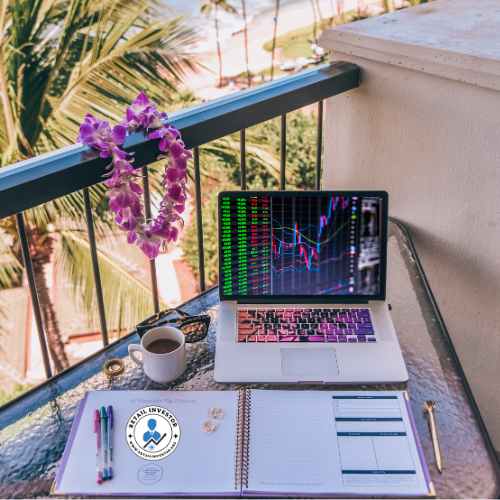Checklist for Becoming a Consistent Day Trader and Passing Prop Trading Exams
Embarking on a career as a day trader, especially with the goal of passing prop trading exams to get fully funded, requires a structured approach and disciplined practice. Here’s a comprehensive checklist to guide you through this process:
1. Education and Learning
- Read Essential Books: Start with the best day trading books right now to build a strong foundation.
- Online Courses and Webinars: Enroll in reputable day trading courses and attend webinars to stay updated on market trends.
- Follow Market News: Stay informed about financial news and market developments.
2. Understanding Trading Platforms
- Choose a Reliable Platform: Use platforms like Robinhood. Learn about navigating the high-speed world of day trading on Robinhood.
- Practice on Simulators: Before risking real money, practice on trading simulators to understand platform functionalities.
3. Technical and Fundamental Analysis
- Study Market Indicators: Master the day trading indicators for success.
- Learn Chart Patterns: Recognize and understand various chart patterns and their implications.
4. Develop a Trading Plan
- Set Clear Goals: Define your financial goals, risk tolerance, and trading style.
- Create a Strategy: Use the beginner’s playbook to day trading to develop your trading strategy.
- Backtest Strategies: Use historical data to test the effectiveness of your trading strategies.
5. Risk Management
- Set Stop-Loss Orders: Protect your capital by setting stop-loss orders for every trade.
- Diversify Trades: Avoid putting all your capital into a single trade.
- Keep a Trading Journal: Document all trades, including successes and failures, to analyze and improve.
6. Psychological Preparation
- Maintain Discipline: Stick to your trading plan and avoid emotional decisions.
- Handle Stress: Develop techniques to manage stress, such as meditation or exercise.
- Stay Patient: Understand that becoming a successful day trader takes time and persistence.
7. Practice with Prop Trading Firms
- Understand Prop Trading Requirements: Research the specific requirements and exam criteria of different prop trading firms.
- Simulate Exam Conditions: Practice trading under simulated conditions that mimic the prop trading exams.
- Get Feedback: Seek feedback from mentors or experienced traders to improve your performance.
8. Continuous Improvement
- Review and Adjust: Regularly review your trading performance and adjust your strategies as needed.
- Stay Educated: Continuously learn about new strategies, tools, and market conditions.
- Join Trading Communities: Engage with other traders through forums and communities to share insights and experiences.
- Save: use Discount Codes for prop firms
By following this checklist, you can systematically prepare yourself to become a consistent day trader and increase your chances of passing prop trading exams to get fully funded. Remember, the key to success in day trading is a combination of knowledge, discipline, and continuous improvement.
https://c-suitenetwork.com/articles/my-funded-futures/
What is Funded Futures Trading?
Funded Futures trading involves the buying and selling of futures contracts, which are standardized agreements to buy or sell an asset at a predetermined price at a specified time in the future. This type of trading allows investors to speculate on the price movements of a wide range of assets, including commodities, currencies, stock indexes, and interest rates.
What Are Futures?
Futures contracts are financial instruments that obligate the buyer to purchase, and the seller to sell, a specific asset at a predetermined price on a future date. These contracts are standardized in terms of the quantity, quality, and delivery time of the underlying asset, making them highly liquid and tradable on futures exchanges.
How Do Futures Work as an Investment?
1. Speculation
One of the primary uses of futures contracts is speculation. Traders buy and sell futures contracts based on their predictions of the future price movements of the underlying assets. If a trader believes the price of an asset will rise, they may buy a futures contract. Conversely, if they expect the price to fall, they may sell a futures contract. Speculators aim to profit from these price changes without necessarily intending to take delivery of the actual asset.
2. Hedging
Futures contracts are also used for hedging purposes. Businesses and investors use futures to protect themselves against the risk of price fluctuations in the underlying assets. For example, a farmer may sell futures contracts on their crop to lock in a price and reduce the risk of a price drop before harvest. Similarly, an airline company may buy futures contracts on fuel to secure a stable price and hedge against the risk of rising fuel costs.
3. Leverage
Futures trading typically involves leverage, allowing traders to control a large position with a relatively small amount of capital. This leverage amplifies both potential gains and losses, making futures trading a high-risk, high-reward investment. Traders are required to maintain a margin account, which acts as a security deposit to cover potential losses.
Key Components of Futures Contracts
1. Underlying Asset
The asset that is being traded, which can be a physical commodity like gold, oil, or agricultural products, or a financial instrument like a stock index or currency.
2. Contract Size
The quantity of the underlying asset covered by the futures contract. For example, a crude oil futures contract might cover 1,000 barrels of oil.
3. Expiration Date
The date on which the futures contract must be settled. On this date, the contract holder must either take delivery of the asset or settle the contract in cash.
4. Settlement Method
Futures contracts can be settled either by physical delivery of the asset or through cash settlement. Most financial futures are cash-settled, while many commodity futures involve physical delivery.
Benefits and Risks of Futures Trading
Benefits
- Liquidity: Futures markets are highly liquid, allowing traders to enter and exit positions easily.
- Leverage: Futures trading allows traders to control large positions with a small amount of capital.
- Diversification: Futures contracts provide exposure to a wide range of assets, enabling diversification of investment portfolios.
- Hedging: Futures can be used to hedge against price risks in various assets.
Risks
- Leverage Risk: The use of leverage amplifies both gains and losses, making futures trading highly risky.
- Market Risk: Futures prices can be highly volatile, leading to significant potential losses.
- Margin Calls: Traders must maintain margin accounts, and if the market moves against their position, they may face margin calls requiring additional capital.
Conclusion
Futures trading is a dynamic and complex form of investing that offers opportunities for speculation, hedging, and leveraging. Understanding how futures contracts work and the risks involved is essential for anyone considering this investment strategy. Whether used for hedging risk or seeking profits from price movements, futures trading requires careful planning, discipline, and a solid grasp of market dynamics.






